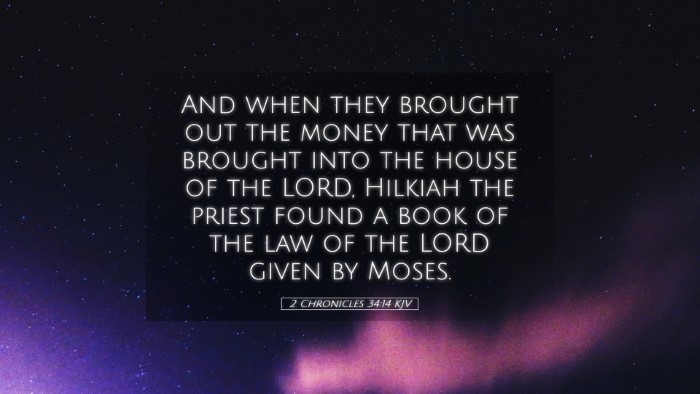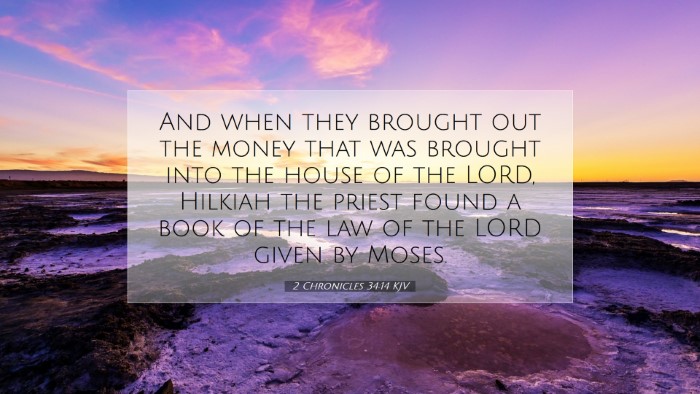Bible Commentary on 2 Chronicles 34:14
Verse Context: 2 Chronicles 34:14 states: "And when they brought out the money that was brought into the house of the Lord, Hilkiah the priest found a book of the law of the Lord given by Moses."
Introduction
This verse marks a significant turning point in the history of Judah under King Josiah. It indicates a rediscovery of the Law, which had been neglected. An examination of public domain commentaries reveals enriching theological insights pertinent for pastors, students, theologians, and Bible scholars.
Historical Context
The background to this discovery is crucial. King Josiah ascended the throne at a young age and initiated reforms aimed at restoring true worship in Judah. The previous kings, leading up to his reign, had largely disregarded the commandments of God, which led to spiritual decay.
According to Matthew Henry, Josiah's reign was characterized by a recovery of true religion. The discovery of the Book of the Law symbolized a renewed commitment to God's covenant and a return to proper worship.
The Role of Hilkiah
Hilkiah, the high priest, plays a pivotal role in this narrative. His diligence in overseeing the temple repairs led to an unexpected but critical finding. Albert Barnes notes that the mention of a "Book of the Law of the Lord" signifies the importance of scripture in worship and reform.
This incident emphasizes that leaders in the church must be committed to identifying and upholding the truths of scripture. As teachers and shepherds, they bear the responsibility of guiding their congregations back to the foundation of the Word.
Understanding the "Book of the Law"
What does the "Book of the Law" signify? Adam Clarke explains that it likely refers to Deuteronomy, the legal and covenantal framework God established for His people. The rediscovery of this book reveals not only the spiritual apathy of Judah but also the intimate connection that God's law has with righteous living.
Henry notes that the recovery of the Law should prompt introspection within congregations today. How often do modern believers engage with scripture? Are they aware of its power to transform hearts and societies?
Theological Implications
The recovery of the Law has profound theological implications. It signifies the enduring authority of God’s Word. Barnes emphasizes that the Law serves as a guide for holiness and ethical living. This recovery process necessitated a collective return to God’s commandments and a rejection of the syncretism that had taken root.
Furthermore, this passage illustrates God's providence. Even amidst spiritual decline, God orchestrates events for the renewal of His covenant people. Henry rightly points out that God's words have a way of being preserved, waiting for the right moment for re-engagement and revival.
Practical Applications
This rediscovery invites contemporary believers to ask critical questions regarding their own engagement with scripture. In what ways have we neglected God's Word? How can we foster a culture of biblical literacy in our communities?
- Personal Reflection: Encourage personal Bible study and meditative reading of the scriptures.
- Community Engagement: Organize group studies to discuss and reflect on the implications of scripture in our lives.
- Preaching and Teaching: Pastors must prioritize expounding upon the Word in a way that is relatable and applicable.
Conclusion
The discovery of the Book of the Law by Hilkiah highlights crucial aspects of spiritual renewal and the authority of scripture. It serves as a reminder of God's persistent call for His people to return to Him. As we study this passage, may it inspire a deeper commitment to God's Word, fostering a transformative and spirit-led community.
This commentary, synthesizing insights from Matthew Henry, Albert Barnes, and Adam Clarke, aims to equip readers with a rich understanding that is both theological and practical, urging each individual to engage actively with the scriptures.


